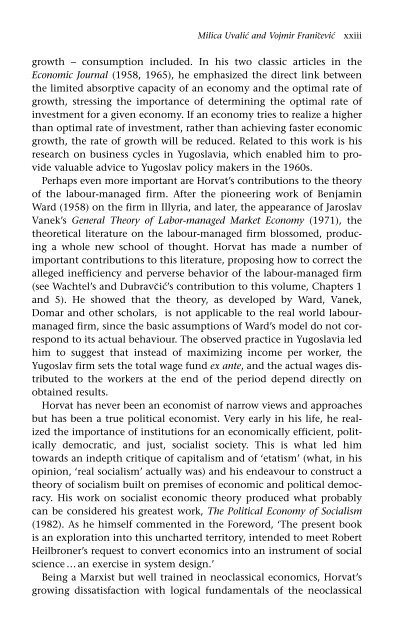Equality, Participation, Transition: Essays in Honour of Branko Horvat
Equality, Participation, Transition: Essays in Honour of Branko Horvat
Equality, Participation, Transition: Essays in Honour of Branko Horvat
You also want an ePaper? Increase the reach of your titles
YUMPU automatically turns print PDFs into web optimized ePapers that Google loves.
Milica Uvalić and Vojmir Franicaević xxiii<br />
growth – consumption <strong>in</strong>cluded. In his two classic articles <strong>in</strong> the<br />
Economic Journal (1958, 1965), he emphasized the direct l<strong>in</strong>k between<br />
the limited absorptive capacity <strong>of</strong> an economy and the optimal rate <strong>of</strong><br />
growth, stress<strong>in</strong>g the importance <strong>of</strong> determ<strong>in</strong><strong>in</strong>g the optimal rate <strong>of</strong><br />
<strong>in</strong>vestment for a given economy. If an economy tries to realize a higher<br />
than optimal rate <strong>of</strong> <strong>in</strong>vestment, rather than achiev<strong>in</strong>g faster economic<br />
growth, the rate <strong>of</strong> growth will be reduced. Related to this work is his<br />
research on bus<strong>in</strong>ess cycles <strong>in</strong> Yugoslavia, which enabled him to provide<br />
valuable advice to Yugoslav policy makers <strong>in</strong> the 1960s.<br />
Perhaps even more important are <strong>Horvat</strong>’s contributions to the theory<br />
<strong>of</strong> the labour-managed firm. After the pioneer<strong>in</strong>g work <strong>of</strong> Benjam<strong>in</strong><br />
Ward (1958) on the firm <strong>in</strong> Illyria, and later, the appearance <strong>of</strong> Jaroslav<br />
Vanek’s General Theory <strong>of</strong> Labor-managed Market Economy (1971), the<br />
theoretical literature on the labour-managed firm blossomed, produc<strong>in</strong>g<br />
a whole new school <strong>of</strong> thought. <strong>Horvat</strong> has made a number <strong>of</strong><br />
important contributions to this literature, propos<strong>in</strong>g how to correct the<br />
alleged <strong>in</strong>efficiency and perverse behavior <strong>of</strong> the labour-managed firm<br />
(see Wachtel’s and Dubravcaić’s contribution to this volume, Chapters 1<br />
and 5). He showed that the theory, as developed by Ward, Vanek,<br />
Domar and other scholars, is not applicable to the real world labourmanaged<br />
firm, s<strong>in</strong>ce the basic assumptions <strong>of</strong> Ward’s model do not correspond<br />
to its actual behaviour. The observed practice <strong>in</strong> Yugoslavia led<br />
him to suggest that <strong>in</strong>stead <strong>of</strong> maximiz<strong>in</strong>g <strong>in</strong>come per worker, the<br />
Yugoslav firm sets the total wage fund ex ante, and the actual wages distributed<br />
to the workers at the end <strong>of</strong> the period depend directly on<br />
obta<strong>in</strong>ed results.<br />
<strong>Horvat</strong> has never been an economist <strong>of</strong> narrow views and approaches<br />
but has been a true political economist. Very early <strong>in</strong> his life, he realized<br />
the importance <strong>of</strong> <strong>in</strong>stitutions for an economically efficient, politically<br />
democratic, and just, socialist society. This is what led him<br />
towards an <strong>in</strong>depth critique <strong>of</strong> capitalism and <strong>of</strong> ‘etatism’ (what, <strong>in</strong> his<br />
op<strong>in</strong>ion, ‘real socialism’ actually was) and his endeavour to construct a<br />
theory <strong>of</strong> socialism built on premises <strong>of</strong> economic and political democracy.<br />
His work on socialist economic theory produced what probably<br />
can be considered his greatest work, The Political Economy <strong>of</strong> Socialism<br />
(1982). As he himself commented <strong>in</strong> the Foreword, ‘The present book<br />
is an exploration <strong>in</strong>to this uncharted territory, <strong>in</strong>tended to meet Robert<br />
Heilbroner’s request to convert economics <strong>in</strong>to an <strong>in</strong>strument <strong>of</strong> social<br />
science … an exercise <strong>in</strong> system design.’<br />
Be<strong>in</strong>g a Marxist but well tra<strong>in</strong>ed <strong>in</strong> neoclassical economics, <strong>Horvat</strong>’s<br />
grow<strong>in</strong>g dissatisfaction with logical fundamentals <strong>of</strong> the neoclassical

















